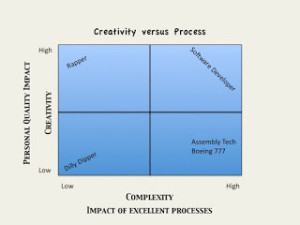Better Processes or better people?
I am sitting in a board room watching Jim Purtell facilitate a planning session. Jim is one of THE BEST strategic and operational planning facilitators on the planet. We often have a friendly argument about whether process or people is the main cause of success or failure in organizations. Being the psych major, I’m a “People” guy in this debate. Jim is most definitely a “Process” guy.
Whether you own a bank, manufacturing company, software developer or lead a non-profit, Jim can process map the organization in a day and find the critical processes that can lead to systems failure if they’re not executed. He’s almost a savant in this regard!
Now I’m looking at his flow chart of 13 major steps, and 50+ action steps and wondering how much our success or failure is dependent on the performance and personal characteristics of the individual tasked with each step versus the integrity of the process. This leads me to the question “Can a great employee overcome a lousy process?” Or, “Can a great process overcome weak players?”
Of course, the answer is “No” to both. But how does a CEO balance the emphasis on process versus people? Maybe the answer is a DEFINITE “It Depends.”

I believe in the concept of matching and balance. Customer to vendor, employee to the job, spouse to spouse. It would be a mistake to “over-process” a team of 20 year old software developers creating a new category web based software. And people will die if Boeing does not execute on its complex projects with tight processes when building airplanes.
One of the greatest business books that looks at this in depth is Discipline of Market Leaders, by Michael Traecy and Fred Wiersema. They breakdown organizations into three types. The first are successful Through Operational Excellence (Fed Ex or Walmart). The second are organizations that make their mark through product leadership (Apple). Their third category are organizations that lead with Customer Intimacy (Lutheran Social Services of WI or your local (good) financial planer). I review this book every time I encounter a new client or prospect. I’d encourage you to read the book and characterize your clients based on their three discipline types.
So in the end, the answer, as always is YES.
Go Pack!







